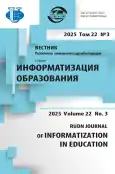Informatization of intra-school work on recording meta-subject results of mastering general education programs
- Авторлар: Gureev S.M.1
-
Мекемелер:
- School No. 14
- Шығарылым: Том 22, № 3 (2025)
- Беттер: 351-360
- Бөлім: MANAGEMENT OF EDUCATIONAL INSTITUTIONS IN THE INFORMATION ERA
- URL: https://journal-vniispk.ru/2312-8631/article/view/321328
- DOI: https://doi.org/10.22363/2312-8631-2025-22-3-351-360
- EDN: https://elibrary.ru/RXPUQG
- ID: 321328
Дәйексөз келтіру
Толық мәтін
Аннотация
Problem Statement. Federal state educational standards of general education require the assessment of meta-subject results of mastering educational programs. Each organization implementing accredited general education programs must comply with this requirement. This activity must be reflected in the information products of the internal system of assessing the quality of education and the information and educational environment of the institution. Due to the information openness of educational organizations, information about the educational results of students in a generalized form must be available on the official websites of the organizations. Studying the information on official websites makes it possible to assess the level of informatization of in-school work on assessing meta-subject results. Thus, a relevant objective is to analyze the current situation with the organization of activities to record the meta-subject results of mastering general educational programs. Methodology. An analysis of self-assessment reports for the presence of meta-subject results was conducted on a sample of 100 schools. The electronic gradebook used in these schools were examined for the presence of technical capabilities for recording meta-subject results, using methods of statistical analysis, text analysis, data visualization, etc. Results. It was found that more than 40% of educational organizations do not mention meta-subject results in reports, and another quarter limit themselves to formal phrases. Only 21% of schools provide qualitative or quantitative data on this category of results. None of the electronic gradebooks studied contain a full-fledged module for recording meta-subject results, which significantly limits the possibilities for their analysis and visualization. Conclusion. The identified low level of computerization of the recording of meta-subject results demonstrates the need to improve digital tools that provides individual record ing of educational results.
Авторлар туралы
Sergei Gureev
School No. 14
Хат алмасуға жауапты Автор.
Email: greatstarmaster@gmail.com
ORCID iD: 0000-0002-1993-0369
SPIN-код: 4975-2720
Vice Principal
32 Academician Anokhin St, Moscow, 119602, Russian FederationӘдебиет тізімі
- Robert IV. Digital transformation of education: challenges and opportunities for improvement. Informatization of Education and Science. 2020;(3):3–16. (In Russ.) EDN: SQWADW
- Volkov SV, Ishbayev ZZ, Shtraus LS. Improving the management of the educational organization through the introduction of information and communication technologies. MCU Journal of Economic Studies. 2023;(1):132–144. (In Russ.) https://doi.org/10.25688/2312-6647.2023.35.1.09 EDN: TXLVMY
- Rasulov MA, Ramazanova ZM. Assessment of meta-subject results according to the requirements of the Federal State Educational Standard. In: Actual Problems of Development of Modern Science and Education: Collection of Scientific Papers Based on the Materials of the International Scientific and Practical Conference, 28 February 2018, Moscow. Moscow: AR-Consult Publ.; 2018. p. 84–86. (In Russ.) EDN: YSSBLG
- Bostan CG. Inter- and transdisciplinary issues present in the school curriculum. Procedia – Social and Behavioral Sciences. 2015;180(5):489–496. https://doi.org/10.1016/j.sbspro.2015.02.149
- Damdinzhapova OyM. The problems of meta-subject outcomes assestment in general education. Scholarly Notes of Transbaikal State University. 2021;16(1):6–12. (In Russ.) EDN: GBRXTC
- Isupova NI, Soboleva EV, Kobeleva GA, Zaslavskaya OYu. The use of the interactive multifunctional cloud portfolio for constructing and implementing individual educational routes for students in the course of project activities. Perspectives of Science and Education. 2023;(2):641–657. https://doi.org/10.32744/pse.2023.2.38 EDN: TJOTCG
- Aleksashina IYu, Mushtavinskaya IV. Innovations in the system of assessing the quality of education: from meta-subject results of educational activities to the functional literacy of schoolchildren. Pedagogical Science and Practice. 2021;(3):64–69. (In Russ.) EDN: APDPEY
- Galeeva NL. Assessment process in school education: problems and solutions. Pedagogical Education and Science. 2020;(1):69–74. (In Russ.) EDN: XMPEQX
- Evseeva ON. Integration information and educational environment of an educational organization in the context of the transition to the Federal State Educational Standard of Secondary General Education. Design. An Experience. Result. 2019;(2):39–43. (In Russ.) EDN: QOCUGO
- Torsunova ER. On features of digital transformation in the sphere ot state and municipal covernance. In: Samoilov AN. (ed.) Public and municipal administration in Russia: state, problems and prospects: materials of the All-Russian Scientific and Practical Conference, 18 November 2021, Perm. Perm: Perm branch RANEPA Publ.; 2021. p. 98–103. (In Russ.) EDN: QHZZLM
- Basyuk VS, Kovaleva GS. Innovative project of the Ministry of Education “Monitoring the formation of functional literacy”: main directions and first result. Otechestvennaya i zarubezhnaya pedagogika = Domestic and Foreign Pedagogy. 2019;1(4):13–33. (In Russ.) EDN: QHDFQS
- Fedotova EV, Izmailova GV. Using reports of the ‘Network city module. Education’ of the state information system in the Chelyabinsk region (GIS ‘Education’) in the process of quality control of the educational process. Scientific and Methodical Provision to Assessment the Education Quality. 2023;(2):58–62. (In Russ.) EDN: MNFSZP
- Grinshkun VV, Remorenko IM. Frontiers of Moscow Electronic School. Informatics and Education. 2017;(7):3–8. (In Russ.) EDN: ZRNNQZ
- Bronnikova NA. Resources of the digital platform Dnevnik.ru: ways to improve the efficien cy of education management. Continuity in Education. 2021;(28):503–510. (In Russ.) EDN: RBRFMZ
- Zakirov RF, Tarutin AV. The use of systems of accounting and analysis of academic performance in the educational process. In: Eltyshev DK. (ed.) Innovative Technologies: Theory, Tools, Practice: Proceedings of the XIII International Internet Conference of Young Scientists, Postgraduates, and Students, 16 November – 31 December 2021. Perm: Perm National Research Polytechnic University Publ.; 2022. p. 22–28. (In Russ.) EDN: OHAOQF
Қосымша файлдар









